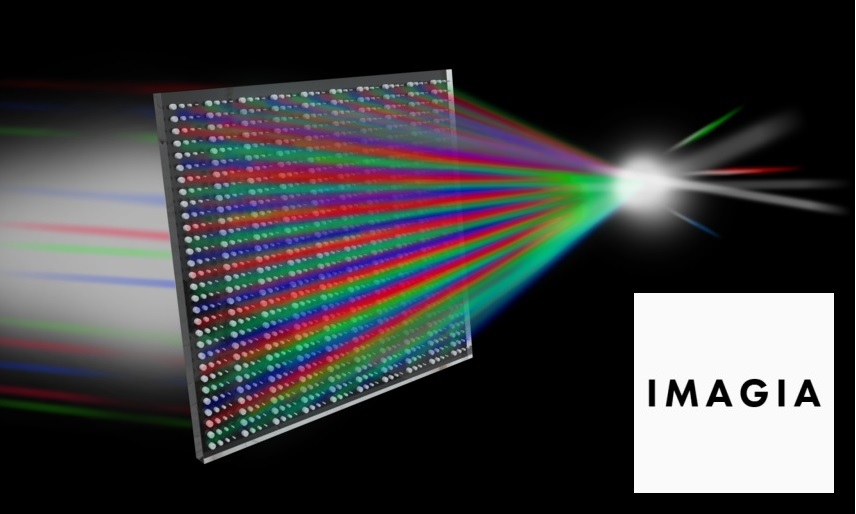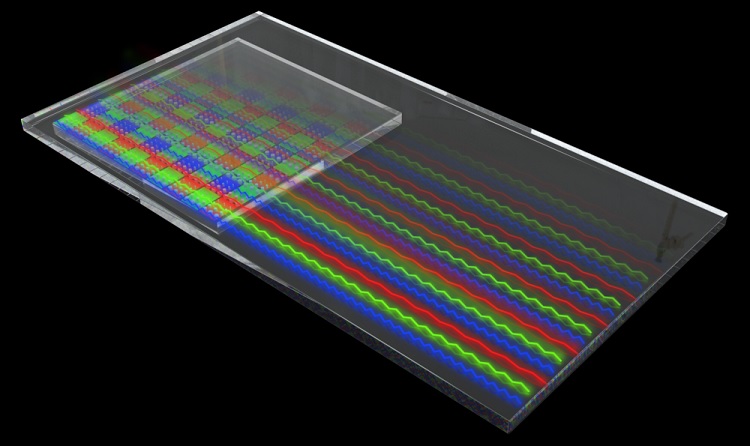
In Augmented Reality and Virtual Reality News
May 2, 2023 – Imagia, a developer of next-generation lens technology, has recently announced the close of a USD $4.5M seed round. Led by Gates Frontier and joined by MetaVC Partners and other strategic investors, the funding will help Imagia to accelerate the development and initial commercial deployment of the company’s first generation of flat, silicon-based optical lenses.
Imagia stated that its metalens technology can shrink an entire optical assembly into a planar, wafer-thin device, resulting in a dramatic reduction in size and complexity for optical assemblies. According to Imagia, using a patent-pending approach, the company’s technology can precisely pattern nanoscale structures directly onto various substrates, creating completely flat metalenses that steer light waves by design, and without the need for traditional curved lenses. The lenses can be square or round, and can be made as small as a single pixel on a digital display.
Imagia noted that makers of complex optoelectronic products such as augmented and virtual reality (AR/VR) headsets are constantly having to make tradeoffs between ergonomic form and optical function due to constraints and limitations of traditional bulk optics. These limitations no longer apply with metalenses, which afford manufacturers more optical design flexibility to achieve higher-performing products with a reduction in size, weight and complexity, according to Imagia.
The company also claims that its approach allows for completely new device architectures; its metalenses can be built directly on top of CMOS* devices like LEDs and image sensors in the same fabrication flow, which eliminates several critical steps of opto-mechanical alignment.
*Complementary metal-oxide semiconductors are the semiconductor technology used in most of today’s microchips.

“Metamaterials are a true paradigm shift in the way we manipulate light, akin to the shift from analog to digital computing,” said Greg Kress, CEO of Imagia. “Traditional glass lenses have been around for hundreds of years. The inherent constraints of working with these types of lenses result in complex, bulky optical assemblies that require precise mechanical alignments. Imagia changes that approach by building lenses like integrated circuits, something that was not possible until very recently.”
Currently at the prototype stage, Imagia stated that its metalens technology has demonstrated an overall reduction in optical system volume by >90% in a variety of applications including lightweight, high-performance AR glasses and next-generation holographic displays. The company added that it is also working to lay the foundation to expand into image sensing lens design, in order to bring significant benefits to smartphone camera, satellite and computer vision system design, according to Imagia.
“We are firm believers that the next generation of AR glasses will be powered by this kind of metalens technology,” said David Bonelli, Founder & CEO of Pulsar, the AR hardware and optics design firm behind Red6’s ATARS and NuEyes’s NuLoupes. “Imagia’s metalens technology promises to open up new frontiers in optical design that were previously impossible.”
Imagia added that it is now working in partnership with Pulsar to explore future applications for metalenses.
Founded by Greg Kress, a Stanford PhD engineer, and led by a team of optical physicists and materials science engineers, Imagia is aiming to reshape the next generation of high-performance optoelectronics devices through its patent-pending metalens technology, and the use of proprietary, silicon-based optical materials and state-of-the-art lithography tools.
Imagia noted that it is currently developing products for customers in augmented reality displays and LED illumination. For more information on Imagia and its next-generation lens technology for the XR industry, please visit the company’s website.
Image credit: Imagia
About the author
Sam is the Founder and Managing Editor of Auganix. With a background in research and report writing, he has been covering XR industry news for the past seven years.




